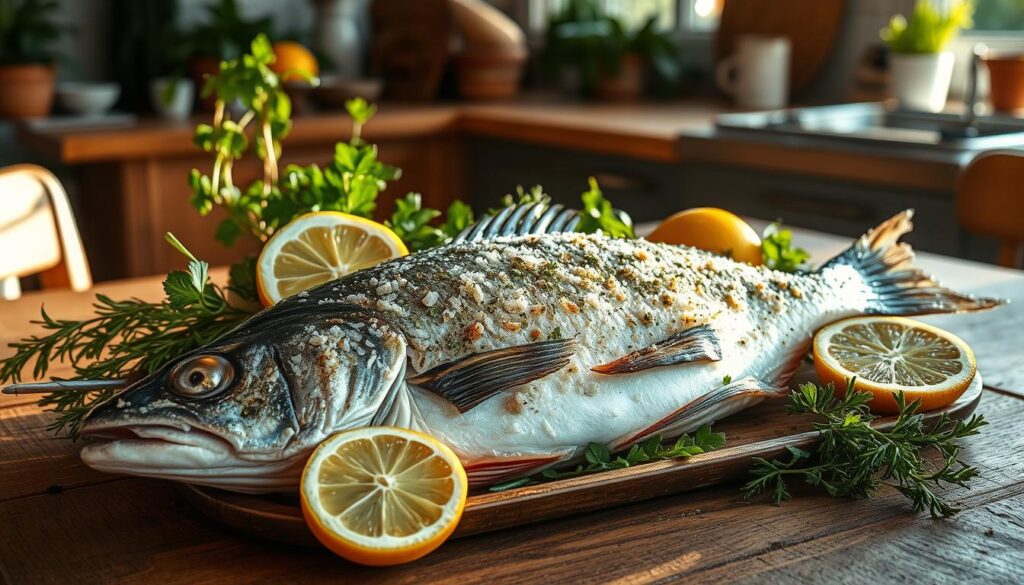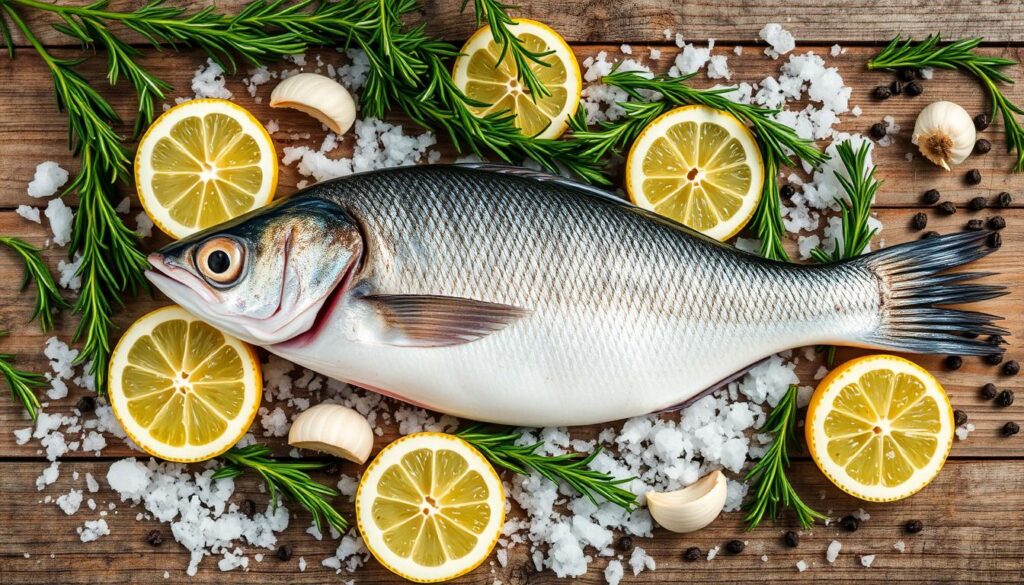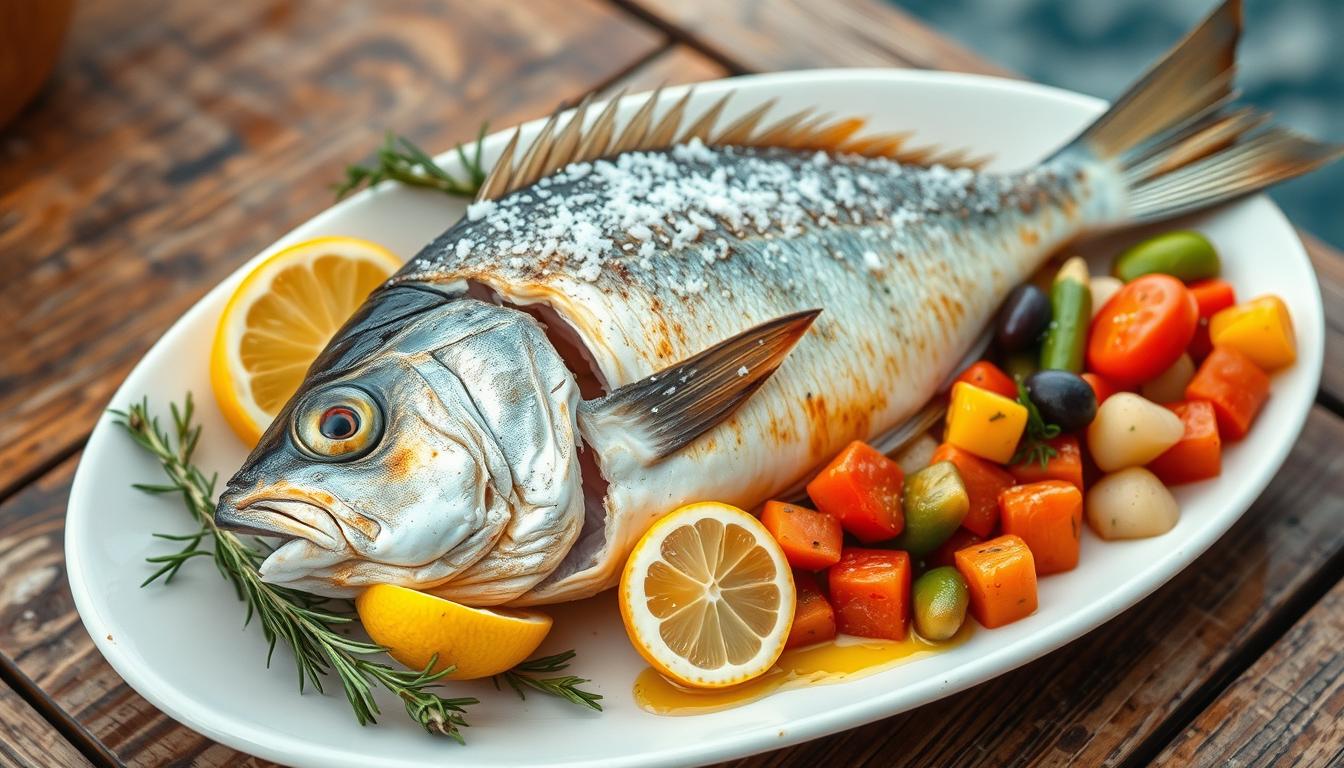This post contains affiliate links.
Standing on the Mediterranean’s sun-kissed shores, I felt the salty breeze. It carried the scent of a dish that would change my view of seafood. Salt baked sea bream, a true Mediterranean gem, promised flavors and tradition.
This whole fish recipe, known as Shiogama-yaki in Japanese, involves baking sea bream in salt. It seals in moisture, adds a hint of salt, and brings out the fish’s sweetness. Watching chefs prepare it, I saw salt crust baking as more than cooking. It’s an art that turns a simple fish into a culinary marvel.
The sea bream, with its firm white flesh and delicate taste, is perfect for salt baking. Learning about this Mediterranean treat, I found it’s not just about taste. It’s about the thrill of cracking open the salt crust to reveal the fish inside, a moment of culinary joy.
Key Takeaways
- Salt baked sea bream is a quintessential Mediterranean dish
- Shiogama-yaki technique preserves natural flavors and moisture
- Sea bream’s firm texture makes it ideal for salt crust baking
- This cooking method enhances the fish’s natural sweetness
- Salt baking is both a culinary technique and a dining experience
- The dish offers a perfect balance of flavor and tradition
Introduction to Salt Baked Sea Bream
Salt baked sea bream is a standout in seafood dishes. It uses a special cooking method that brings out the fish’s natural flavors. Let’s explore the world of salt-baked fish and why it’s loved by many.
Origins of the Salt Baking Technique
The salt baking method started in Spain’s salt flats, like Murcia, Alicante, and Andalusia. Fish is covered in a thick salt layer, creating a hard crust during baking. This technique has been around for centuries, making fish tender and delicious.
Popularity in Mediterranean Cuisine
In Mediterranean cuisine, salt-baked sea bream is very popular. Spain alone produces about 15,000 tons of farmed sea bream each year. Beachside restaurants serve this dish, drawing in both locals and tourists with its beautiful look and taste.
Benefits of Salt Baking Fish
Salt-baked fish has many benefits:
- It keeps the fish moist, making it tender and juicy
- It brings out the fish’s natural flavors
- It makes the dish look stunning
- It absorbs excess fat during cooking
The cooking time is about 40-45 minutes at 390°F, ensuring a perfectly cooked sea bream every time.
| Characteristic | Wild-Caught Sea Bream | Farmed Sea Bream |
|---|---|---|
| Weight Range | 25 ounces – 8 lb | 7 ounces – 35 ounces |
| Fishing Season | Fall | Year-round availability |
| Fat Content | Semi-fat | Semi-fat |
| Suitability for Diets | Good for weight control | Good for weight control |
The History and Tradition of Salt Baked Fish
Salt crust baking is a key part of Mediterranean cuisine, with roots in ancient times. The first salt-baked fish recipe is found in “Hedypatheia,” a poem by Greek Epicurean poet Archestratos from 330 BC. This method has grown in popularity, especially for cooking dorada and other seafood.
There are three main ways to make salt-baked fish:
- Basic: Salt covers the fish entirely
- Water-bound: Salt mixed with water for better adhesion
- Sophisticated: Egg whites create a meringue-like crust
The water-bound method is both affordable and tasty. Oiling the fish skin helps the crust not stick, making it look better. This method cooks the fish evenly, keeping it moist and flavorful.

This cooking method adds to the joy of dining, often used for special occasions in coastal Mediterranean areas. It’s especially loved for making dorada recipes, highlighting the importance of seafood in Mediterranean culture.
Salt-baked fish absorbs flavors more evenly throughout, enhancing the taste experience compared to plain roasted fish.
The tradition of salt crust baking continues to attract food lovers around the world. It offers a special way to enjoy the Mediterranean’s seafood. From Spanish coastal towns to Greek island restaurants, this method shows the region’s culinary creativity.
| Fish Weight | Salt Quantity | Baking Time |
|---|---|---|
| 700-800g | 1.5kg | 25 minutes |
| 1.5kg | 2.5kg | 35 minutes |
| 2.2kg | 3.5kg | 45 minutes |
Today, salt crust baking is still a beloved technique, connecting ancient traditions with modern Mediterranean cuisine. Its lasting appeal comes from making fish moist and full of flavor. It’s a must-try for seafood fans visiting the Mediterranean region.
Selecting the Perfect Sea Bream for Salt Baking
Choosing the right sea bream is key for tasty whole fish recipes and gourmet seafood dishes. The best sea bream for salt baking should be fresh, the right size, and of high quality. This ensures a memorable dining experience.
Characteristics of High-Quality Sea Bream
When picking sea bream, look for these important features:
- Clear, bright eyes
- Vibrant red gills
- Firm flesh that springs back when touched
- Fresh, ocean-like smell
Sea bream is a nutritious choice for gourmet seafood preparations. A 100g serving has 172kcal, 11.1g of fat, and 16g of protein. It also has essential B vitamins.
Wild-Caught vs. Farmed Sea Bream
Wild-caught sea bream is often preferred, but farmed options are also high-quality. Most sea bream in the UK comes from Mediterranean farms. Spain leads in producing farmed gilt-head bream in the region.
Optimal Size for Salt Baking
For the best salt baked sea bream, follow these guidelines:
| Serving Size | Fish Weight | Baking Time |
|---|---|---|
| Individual | 400-450g (14-16 oz) | 25-30 minutes |
| Group (4-6 people) | 1.4-1.8kg (3-4 lbs) | 45-60 minutes |
Make sure to gut the fish through the gills to keep its shape during baking. This preparation is crucial for the best results in your whole fish recipes and sea bream dishes.
Essential Ingredients for Salt Baked Sea Bream

Salt Baked Sea Bream is a gourmet seafood dish. It needs specific ingredients for the best salt crust baking. The main ingredient is fresh sea bream, best if it comes from Loctudy, Brittany. For two fish, you’ll need 2-3 kg of coarse sea salt to make the crust right.
Egg whites are key to binding the salt. Water helps make the crust. You can also add herbs like thyme, rosemary, or bay leaves for more flavor. Some people add lemon slices and olive oil for extra taste.
Here’s a list of essential ingredients:
- Whole sea bream (cleaned and scaled)
- Coarse sea salt (Gros Sel Marin)
- Egg whites
- Water
- Fresh herbs (optional)
- Lemon slices (optional)
- Extra virgin olive oil (optional)
Try making Mamie Fouesnants Shallot Cream Sauce as a side dish. It has shallots, white wine, fish stock, salted butter, and cream. Serve your Salt Baked Sea Bream with a crisp Petit Chablis for a Mediterranean touch.
“The salt-baking method brings out the best flavors in sea bream, creating a dish that’s both simple and sophisticated.”
Step-by-Step Guide to Preparing Salt Baked Sea Bream
Salt-baked fish techniques are a unique way to make tasty fish dishes. This guide will show you how to prepare a delicious salt-baked sea bream. It’s a favorite for whole fish recipes.
Preparing the Fish
Begin by rinsing your sea bream and drying it. Keep the scales on as they protect the flesh. Use a fish about 1 kg for the best results. Score the skin lightly for even cooking.
Creating the Salt Crust
Mix 2-3 kg of coarse sea salt with egg whites and water until it’s like damp sand. This mixture will be the protective crust for your fish. Spread a layer of salt on a baking sheet, place the sea bream on top, and cover it completely with the remaining salt.
Baking Techniques and Tips
Preheat your oven to 250°C (482°F). Bake the salt-encrusted sea bream for about 30 minutes. The high heat and salt crust seal in moisture and flavor. You’ll know it’s done when the fish’s eye turns milky-white or a fin easily pulls away.
“Salt-baking is a technique that perfectly preserves the fish’s natural flavors while creating a tender, moist texture,” says renowned chef Marie Fouesnant.
After baking, let the fish rest briefly before cracking open the salt crust. Serve your salt-baked sea bream with Mamie Fouesnant’s Shallot Cream Sauce for a true Mediterranean taste.
The Science Behind Salt Baking: Flavor and Texture
Salt crust baking turns simple fish into a feast for the taste buds. It seals the fish in a salt crust, trapping moisture and boosting flavors. This method ensures the fish cooks evenly, keeping it moist and flavorful.
Even though the fish is wrapped in salt, it doesn’t taste too salty. The fish’s scales and skin protect its tender flesh. This technique also makes the fish firmer and keeps its juices in.
The Salt Effect
Salt is key in cooking, enhancing flavors and balancing tastes. In salt crust baking, it makes the fish firmer and juicier. The heat from the crust triggers the Maillard Reaction, creating a delicious brown color.
“Salt is the conductor of flavor in cooking. It enhances the natural taste of ingredients and brings out their best qualities.” – Chef Alice Waters
Nutritional Impact
While salt crust baking makes food tasty, it’s important to watch sodium intake. Most salt we eat comes from packaged foods. But, this cooking method doesn’t add much sodium to the fish, making it a healthier choice.
| Cooking Method | Moisture Retention | Flavor Intensity | Texture |
|---|---|---|---|
| Salt Crust Baking | High | Enhanced | Firm, Juicy |
| Grilling | Low | Smoky | Dry, Flaky |
| Poaching | Medium | Mild | Soft, Tender |
Salt Baked Sea Bream: A Mediterranean Delight
Salt baked sea bream is a highlight of Mediterranean cuisine. It shows the rich food traditions of the area. Each country puts its own spin on this dish.
Regional Variations in Mediterranean Countries
In the Mediterranean, salt baked sea bream is known as Dorada in Spain. Spanish chefs often add zesty alioli or vibrant salsa verde. In Greece, a squeeze of lemon and olive oil brings out the fish’s flavor. Italian chefs might use herbs like rosemary or thyme in the salt crust.
Traditional Accompaniments
The right sides for salt baked sea bream change with the region:
- Steamed potatoes
- Grilled Mediterranean vegetables
- Light, crisp salads
- Green mayonnaise (parsley, garlic, lemon juice)
Wine Pairing Suggestions
Here are some wines that go well with this dish:
| Wine | Region | Flavor Profile |
|---|---|---|
| Albariño | Spain | Crisp, citrusy |
| Verdejo | Spain | Fresh, herbaceous |
| Pinot Grigio | Italy | Light, refreshing |
| Sauvignon Blanc | France | Zesty, aromatic |
Recipes for salt baked sea bream often use 4 pounds of coarse sea salt for 6 people. Bake at 475°F for 20-30 minutes, based on the fish’s thickness. This dish goes well with many sides, making it a key part of Mediterranean cuisine.
Serving and Presentation Tips for Salt Baked Sea Bream
Salt baked sea bream is a true showstopper. Its presentation can make your meal even more special. Start by bringing the whole fish to the table. This dramatic reveal gets everyone excited.
To serve, crack the salt crust with a heavy knife. Then, remove the skin and fillet the fish. Place the tender flesh on heated plates for the best taste. Add lemon wedges and fresh herbs for extra flavor and visual appeal.
For a touch of luxury, drizzle olive oil over the fish or serve with a light vinaigrette. Remember to have table salt ready, as the crust doesn’t make the fish too salty. This way, you’ll get a moist, flavorful dish that will wow your guests.
“The presentation of salt baked sea bream is an art form that transforms a simple fish into a culinary masterpiece.”
For a professional touch, look at Gordon Ramsay’s salt-crusted sea bream video. It has nearly 200,000 views on YouTube. Ramsay suggests baking the fish at 350°F until it reaches 125°F. This usually takes about 25 minutes per pound.
- Bring the whole salt-encrusted fish to the table
- Use a heavy knife to crack the salt crust
- Carefully remove skin and fillet the fish
- Serve on heated plates with lemon and herbs
- Offer high-quality olive oil or vinaigrette
By following these tips, you’ll create a memorable dining experience. It will celebrate the art of salt baking and the delicate flavors of sea bream.
Health Benefits of Consuming Salt Baked Sea Bream
Salt baked sea bream is a great example of Mediterranean cuisine’s power. It turns seafood into healthy dishes. This method boosts flavor and keeps the fish’s nutrients intact.
Nutritional Profile of Sea Bream
Sea bream is a lean fish, low in fat. A 100g serving has 18g of protein and just 3g of fat. It’s full of vitamins B12 and B6, selenium, and phosphorus. These nutrients help your nerves stay healthy.
| Nutrient | Amount per 100g |
|---|---|
| Protein | 18g |
| Fat | 3g |
| Vitamin B12 | High |
| Selenium | High |
Advantages of Salt Baking Method
Salt baking is a low-calorie way to cook. It keeps the fish’s natural taste and moisture. The salt crust seals in the fish’s juices, making it moist and flavorful.
Considerations for Sodium Intake
Even with the salt crust, the fish’s sodium is low. But, those watching their sodium should eat it in small amounts. Always talk to a doctor before trying new foods.
For more seafood choices, check out striped marlin fishing destinations. They offer fresh, healthy catches.
Adding salt baked sea bream to your diet is tasty and healthy. It’s a great way to enjoy Mediterranean cuisine. Just remember to eat a variety of foods for the best health.
Alternative Fish Species for Salt Baking
Sea bream is great for salt-baked fish, but other fish can be just as tasty. Sea bass, grey mullet, snapper, and grouper are all good options. They have firm flesh and work well with the salt baking method.
In Spanish cooking, besugo and pargo, types of bream, are favorites for salt baking. To get the best results, choose fresh fish that’s been scaled properly. For a 3-pound fish, mix 2 cups of coarse sea salt with 1 cup of fine sea salt. Add one egg white to bind it all together, making a 1/4-inch thick crust.
Bake your fish at 460°F for about 40 minutes. It should reach 130°F when checked with an instant-read thermometer. Let it rest for 10 minutes before breaking the salt crust. This will reveal your perfectly cooked fish. Serve it with a delicious Romesco sauce for a true Mediterranean taste.
FAQ
What is salt baked sea bream?
What are the origins of the salt baking technique?
What are the benefits of salt baking fish?
How do I select the perfect sea bream for salt baking?
What are the essential ingredients for salt baked sea bream?
How do I prepare the salt crust for baking?
What is the science behind the flavor and texture of salt baked fish?
How is salt baked sea bream served in Mediterranean countries?
What are the best ways to present and serve salt baked sea bream?
Is salt baked sea bream a healthy option?
Can other fish species be used for salt baking?
This post contains affiliate links.

